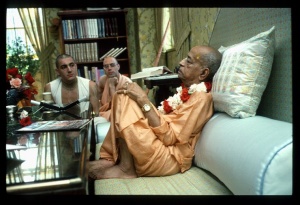SB 4.2.6: Difference between revisions
(Vanibot #0018 edit: make synonym terms in Sanskrit italic in SB - Vanisource) |
(Vanibot #0054 edit - transform synonyms into clickable links, which search similar occurrences) |
||
| Line 23: | Line 23: | ||
<div class="synonyms"> | <div class="synonyms"> | ||
''udatiṣṭhan'' | ''[//vanipedia.org/wiki/Special:VaniSearch?s=udatiṣṭhan&tab=syno_o&ds=1 udatiṣṭhan]'' — stood up; ''[//vanipedia.org/wiki/Special:VaniSearch?s=sadasyāḥ&tab=syno_o&ds=1 sadasyāḥ]'' — the members of the assembly; ''[//vanipedia.org/wiki/Special:VaniSearch?s=te&tab=syno_o&ds=1 te]'' — they; ''[//vanipedia.org/wiki/Special:VaniSearch?s=sva&tab=syno_o&ds=1 sva]-[//vanipedia.org/wiki/Special:VaniSearch?s=dhiṣṇyebhyaḥ&tab=syno_o&ds=1 dhiṣṇyebhyaḥ]'' — from their own seats; ''[//vanipedia.org/wiki/Special:VaniSearch?s=saha&tab=syno_o&ds=1 saha]-[//vanipedia.org/wiki/Special:VaniSearch?s=agnayaḥ&tab=syno_o&ds=1 agnayaḥ]'' — along with the fire-gods; ''[//vanipedia.org/wiki/Special:VaniSearch?s=ṛte&tab=syno_o&ds=1 ṛte]'' — except for; ''[//vanipedia.org/wiki/Special:VaniSearch?s=viriñcām&tab=syno_o&ds=1 viriñcām]'' — Brahmā; ''[//vanipedia.org/wiki/Special:VaniSearch?s=śarvam&tab=syno_o&ds=1 śarvam]'' — Śiva; ''[//vanipedia.org/wiki/Special:VaniSearch?s=ca&tab=syno_o&ds=1 ca]'' — and; ''[//vanipedia.org/wiki/Special:VaniSearch?s=tat&tab=syno_o&ds=1 tat]'' — his (Dakṣa's); ''[//vanipedia.org/wiki/Special:VaniSearch?s=bhāsa&tab=syno_o&ds=1 bhāsa]'' — by the luster; ''[//vanipedia.org/wiki/Special:VaniSearch?s=ākṣipta&tab=syno_o&ds=1 ākṣipta]'' — are influenced; ''[//vanipedia.org/wiki/Special:VaniSearch?s=cetasaḥ&tab=syno_o&ds=1 cetasaḥ]'' — those whose minds. | ||
</div> | </div> | ||
Latest revision as of 21:31, 18 February 2024

His Divine Grace
A.C. Bhaktivedanta Swami Prabhupada
A.C. Bhaktivedanta Swami Prabhupada
TEXT 6
- udatiṣṭhan sadasyās te
- sva-dhiṣṇyebhyaḥ sahāgnayaḥ
- ṛte viriñcāṁ śarvaṁ ca
- tad-bhāsākṣipta-cetasaḥ
SYNONYMS
udatiṣṭhan — stood up; sadasyāḥ — the members of the assembly; te — they; sva-dhiṣṇyebhyaḥ — from their own seats; saha-agnayaḥ — along with the fire-gods; ṛte — except for; viriñcām — Brahmā; śarvam — Śiva; ca — and; tat — his (Dakṣa's); bhāsa — by the luster; ākṣipta — are influenced; cetasaḥ — those whose minds.
TRANSLATION
Influenced by his personal bodily luster, all the fire-gods and other participants in that great assembly, with the exceptions of Lord Brahmā and Lord Śiva, gave up their own sitting places and stood in respect for Dakṣa.